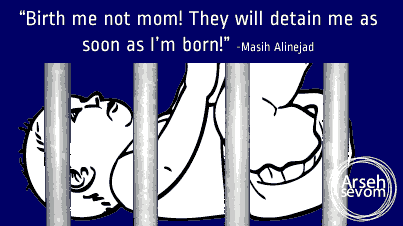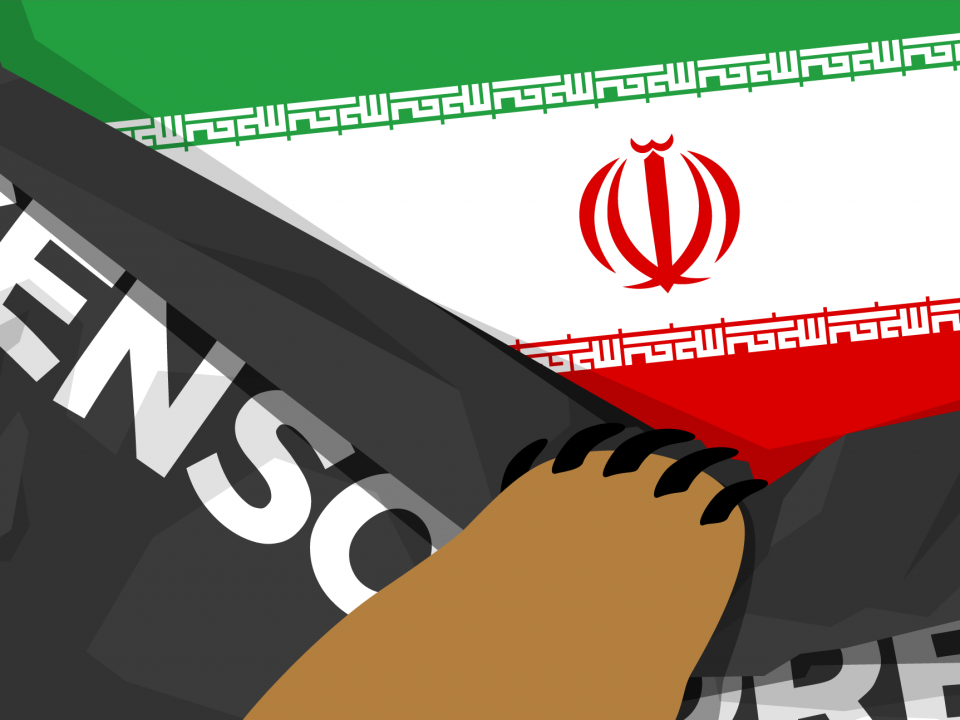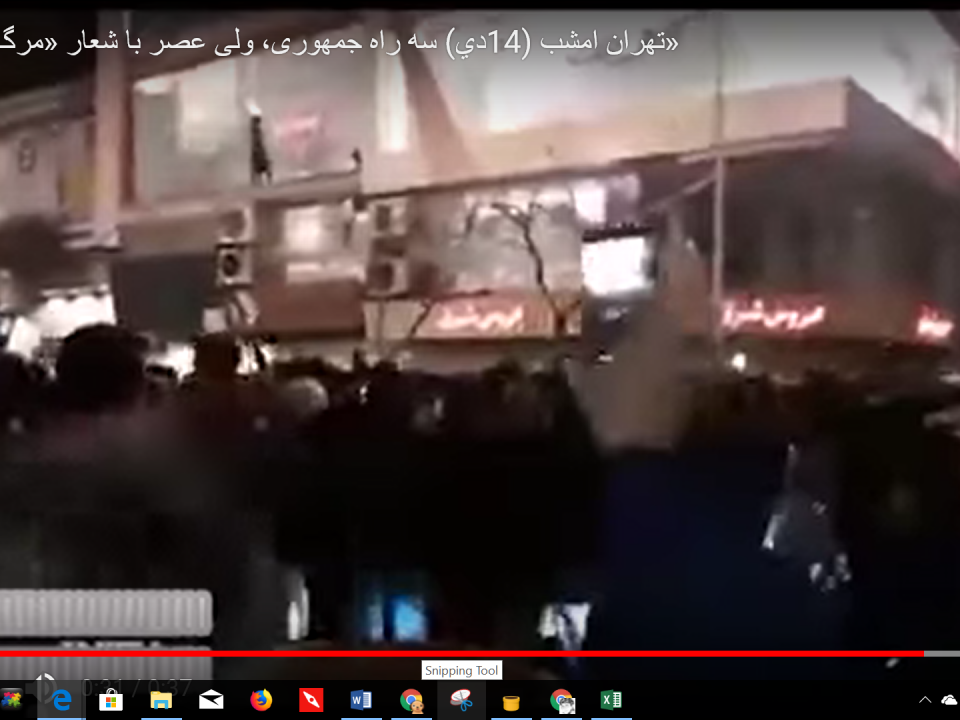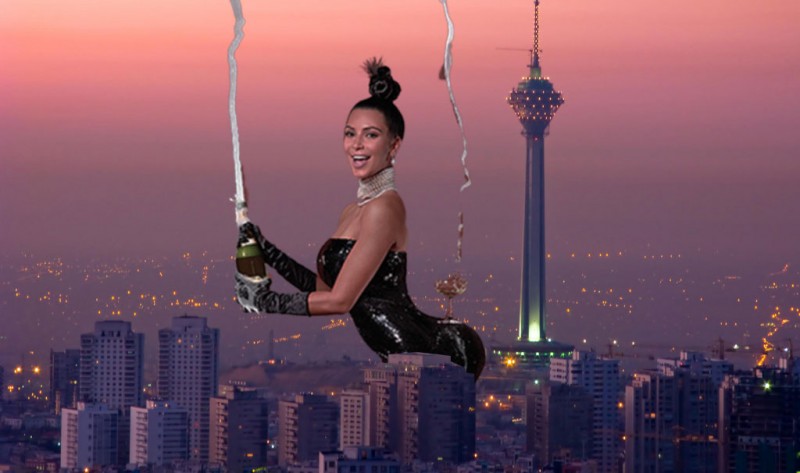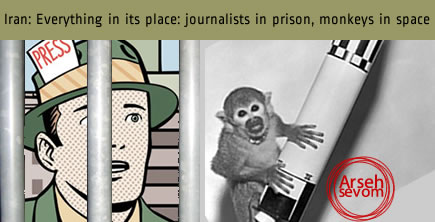
Iran: A Monkey in Space, Journalists in Prison
January 31, 2013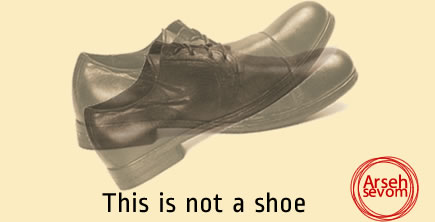
Iran: Power Struggle, Shoes, Lost Revenues
February 7, 2013In the wake of a crackdown on journalists in Iran combined with the harassment of their family and friends, no news is bad news. The Ministry of Intelligence promises there won’t be an end to the arrests until the entire network is revealed, claiming that those arrested are being arrested for collaborating with foreign forces rather than working as journalists. Exiled journalist Masih Alinejad bitterly jokes of babies begging their mothers not to give birth so that they can avoid detention. Saghi Laghaie warns people to not share any details about those arrested that could be used against them. “Avoid writing about your shared memories or dialogues as they might be used against them…”
Election Engineers Pave the Way for “Free Elections”
George Orwell famously said, “In a time of deceit telling the truth is a revolutionary act.” It seems the authorities in Iran agree. Election “engineers” have been busy. Of course, their easiest target and victim by-default is journalists. In a sudden escalation of repression of newspapers and websites, regime forces have arrested at least 12 journalists, raided the offices of four reformist publications, and suspended a leading conservative site linked to top politician Mohsen Rezaei, who was also a candidate in the 2009 presidential election.
On January 8, 2013, the Supreme Leader gave a speech in which he warned journalists and others to refrain from statements saying that Iran’s elections are not free. Three weeks later, on January 21, Prosecutor General Gholam Hossein Mohseni Ejei announced at a press conference that he had received “reliable information” indicating that “certain journalists in Iran are collaborating with Westerners and counter-revolutionaries based abroad.” Widespread arrests of journalists followed on January 27, less than a week after Ejei’s press conference.
A statement [fa] attributed to Iran’s Ministry of Intelligence followed the arrests declaring:
“The investigation will be continued until the last individual linked to this network is arrested and the propaganda of the foreign media and so-called human rights organizations and the statements… no longer have influence on the strong will of the soldiers of the Imam of the Time [refers to Ministry of Intelligence officials].”
In response to the “Black Sunday” crackdown, Reporters Without Borders [en] condemned the Supreme Leader’s war on journalists. Human Rights Watch [en] released a statement urging the Iranian authorities to immediately free journalists swept up in raids. Amnesty International also called for the immediate release of journalists.
The Iranian security apparatus is highly sensitive about the role of journalists and bloggers prior to elections. Similar arrests took place before the 2012 parliamentary elections and the judiciary threatened that anyone who called for a boycott would be subject to prosecution.
After the raid by Iranian security forces, some reformist newspapers publicly protested against the crackdown. In its January 30th issue, Shargh Daily [fa] published a blank column on its cover page in protest of the arrest of one of its staff members, Pouria Alami, and explained that “it will not be printed until further notice.” Bahar Daily [fa] was another newspaper to protest the arrest of journalists. “Our journalists deserve respect,” wrote “Bahar.”
Many Iranians also protested the arrests by posting pictures of the detained journalists on their Facebook pages. A page on Facebook was created calling for the release of jailed Iranian journalists.
In The Sad Lives of Iranian Journalists [en], Sahand Sahebdivani from the Mezrab Blog writes of the crackdown and journalists:
“I can’t ignore what’s happening in the country of my birth. In the past few days we’ve been treated to a string of sad news items regarding this endangered species.”
The blogger continues:
“The Minister of Culture and Guidance (translated from double-speak that means ministry of censorship) has declared they are not arrested for journalistic work but for working for foreign anti-revolutionary media that spread, which means they are, if convicted, traitors and will receive harsh punishment. What I find interesting is that the government does not admit to arresting reporters in an election year simply for doing their job, but has to brand them traitors working with foreign entities (in the same way homosexuals are arrested but also often get a bogus charge of raping a child so it’s less clear the government hunts homosexuals), but the government does have a special Court of Culture and Media.”
Journalist in exile, Masih Alinejad, posted a piece on her Facebook page [fa] dedicated to satirist Pouria Alami who has been detained. The post reads:
“Birth me not mom! They will detain me as soon as I’m born!”
In another post [fa], she writes: “The free election takes more victims!” She adds:
“They also took Reyhaneh Tabatabaei. Her charge: Journalism… they managed to take 14 journalists to Evin in 48 hours.”
In response to the waves of arrest and the intimidating statement from the Ministry of Intelligence, Masih writes:
“News cannot be imprisoned. The reason behind the mass crackdowns on journalists is to stop the free flow of information. Yet, if you throw the journalist out of the door, she finds her way in through the window…”
Fereshteh Ghazi, another journalist in exile, reacted to the arrests on her Facebook page [fa]. She shared the statement signed by nearly 200 Iranian journalists both inside and outside Iran, objecting to the widespread arrests of their fellow journalists. In a note, Ms. Ghazi writes:
“The arrest of 14 journalists is not just numbers, it’s a disaster. Forget about numbers and write down the names of our honorable colleagues whose only crime is journalism…”
The Green Voice of Freedom [en] has photographs of all those detained. There is also a YouTube video [fa] being shared in which the articles of the Iranian Constitution protecting civilians, journalists, and freedom of information, expression, and assembly are highlighted. The video then gives basic information on the detained journalists and mentions that their “crime” is solely journalism.
Saghi Laghaie offered a few suggestions on her Facebook page [fa] for netizens who care about those arrested:
“Avoid writing about their personal characteristics. Your impatience and concern might get them in trouble (like their sensitivity against cold, light, and so on). Avoid writing about your shared memories or dialogues as they might be used against them… avoid sharing your own speculations of the reason for arrest, duration of it, and their temporary release on bail; they might be used against them by their interrogators. Do not publish anything about their freedom (before it actually happens). This might cause delays in their freedom and add to the suffering of their families and dear ones.”
In his post Election’s thermometer and its freedom flags!” Darioush writes [fa]:
“Ironically these [arrested] journalists could be the very ones to prove that the speculations of unfree and engineered elections (assuming the regime’s claim is legit) are likely untrue (the possibility of impossibility is not impossible!). Yet, looking at it [the crackdown] from every perspective, it is evident that media and journalists are considered a threat to the elections (an election assumed and measured by the regime). As a result, they should be shut down and framed (there is plenty of time for the accusations to become charges during which they [the authorities] can buy time). Anyway, there is no need for anyone to do or say anything to prove that elections are unsafe. Devotees of the regime are doing their utmost best to show that, as bright as the sun, to the world…”
As of December 2012, 43 journalists and bloggers were in prison, according to Reporters Without Borders, the second largest number for any country. In 2013 World Press Freedom Index, Iran ranks 174 out of the 179 countries reviewed.
By: Peyman Majidzadeh


